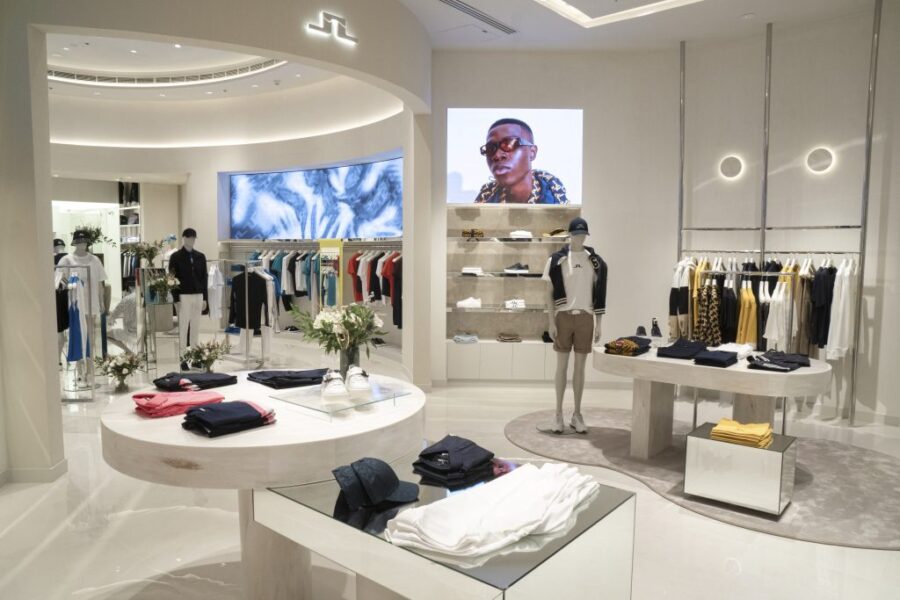
J Lindeberg was started by Johan Lindeberg in 1990s with the aim to revolutionise sports fashion, specifically golfing fashion. Golf has been a rather fashionable sport right from its inception consisting of tweed suits with vests and, if knickers were chosen as trousers, knee-high stockings to complete the outfit back in the 1880s.
In the 1920s, Edward, Prince of Wales, influenced golf fashion with his dashing personal style, especially in his choice of traditional Fair Isle patterned knit pullover sweaters and argyle socks. The knickerbockers of the previous century were the preferred trousers at this time, but now were cut four inches longer than the older version, making them baggier at the knee.
As with most fashion apparel, with time, it evolved with more brands capitalising on sports to sell products. However, Golfwear somehow did not have much competition, which is why Johan Lindeberg decided to fill that gap in the market. The Scandinavian Fashion House was founded in 1996 with the vision to cater to modern and aware consumers who lead an active lifestyle. Today, the brand operates close to 90 stores across 35 countries and recently announced its launch in the Middle East with its flagship store in Dubai Mall.
“J.Lindeberg has a strong global presence and the annual turnover globally is SEK 1.2 Billion (Swedish krona) excl China. Approximately 18% of online sales come from the brand’s own e-commerce platform and 18% come from third-party e-commerce sites. We look at business from a global perspective with our revenue equally split, with 1/3rd archived in America, 1/3rd in APAC and 1/3rd in EMEA,” said Hans-Christian Meyer, CEO of J Lindeberg.
Speaking about the new global flagship store in The Dubai Mall, he said, “The store is a true representation of the J.Lindberg brand and we are really pleased with how the launch of the store has gone. We’re seeing a range of customers visit the store, from existing brand fans to new customers and the customers are buying our more elevated and higher price points items.”
J.Lindeberg entered the retail market here in Dubai in 2020 through eGolf, the official distributor for J.Lindeberg in the Middle East, which increased the brand’s sales to record heights by 205% in the UAE. Being a global hub and an exciting retail destination that attracts a host of international brand, setting up a flagship store at a time when consumer affinity towards athleisure and active wear is at an all-time high made complete sense for J Lindeberg.
According to ReportLinker, the athleisure market is expected to grow from US$ 411. 02 billion in 2021 to US$ 793. 46 billion by 2028 at a CAGR of 9. 9% from 2021 to 2028. The rising trend of fitness and health consciousness is generating demand for comfortable and fashionable activewear. The rapid penetration of e-commerce in the is providing growth opportunities for athleisure manufacturers as it helps them to cater to a larger customer base. Furthermore, the growing influence of lifestyle blogs and celebrity endorsements in marketing athleisure items to a broader customer base favours the market progress.
“We are seeing an incredible surge in sales in the athleisure category since the global pandemic and this just keeps on growing. We are actually seeing growth in all our sporting ranges compared to last year and we launched a tennis and padel collection this Spring. We plan to launch an outdoor collection in Spring 2023 too,” he said.
“This growth has propelled J.Lindeberg to become one of the biggest selling golf brands in United Arab Emirates, which we believe to be due to the mix in our offering of fashion-forward, luxury and high-quality products which we know the UAE market is looking for,” he added.
Consumers today are driven by value and purpose, are more aware and informed, and are looking for convenint and memorable shopping experiences. Technology, be it customer facing or at the back-end, helps facilitate smoother processes and enhance shopping journeys. Contactless checkouts, QR Codes wth product information, AR/VR etc have proven to go a long way in helping with conversions.
“We frequently use video in our store design and display to help our customers understand the emotions of specific collections and we are looking into further technology such as RFID tagging, which will allow us to have magic mirrors in the fitting rooms. We have seen in other stores when using this technology that conversation rates have improved when we are connecting with the customer on an emotional level as video content is a great way to showcase brand emotion,” he said.
The brand has plans to have a strong base in the UAE and will be looking to expand across the country. “Our goal is to inspire the UAE’s energetic urbanites to aim higher and live life to the fullest,” he concluded.
Elevate engagement, experience and profitability to unlock retail growth
Marchon Eyewear’s ZEISS wins 2024 Red Dot “Best of the Best” Awards for VisionClip
Revolutionising retail: How RetailGPT is shaping the future of shopping malls
Times Square Center: Building community through more than retail